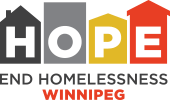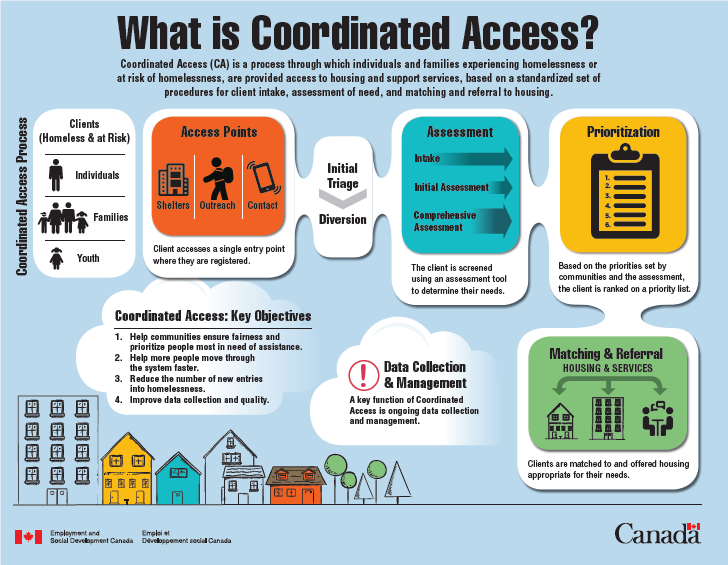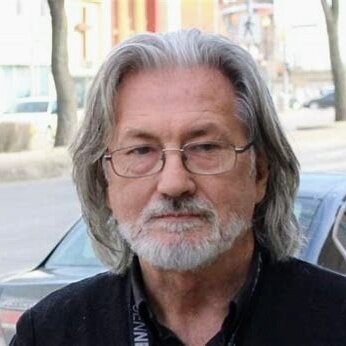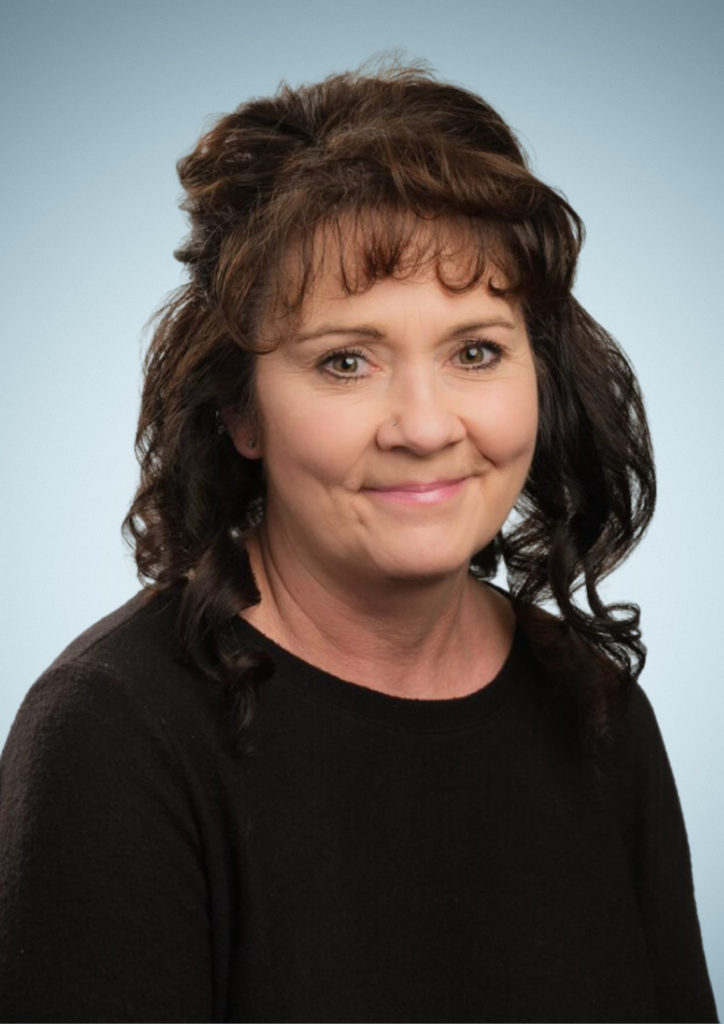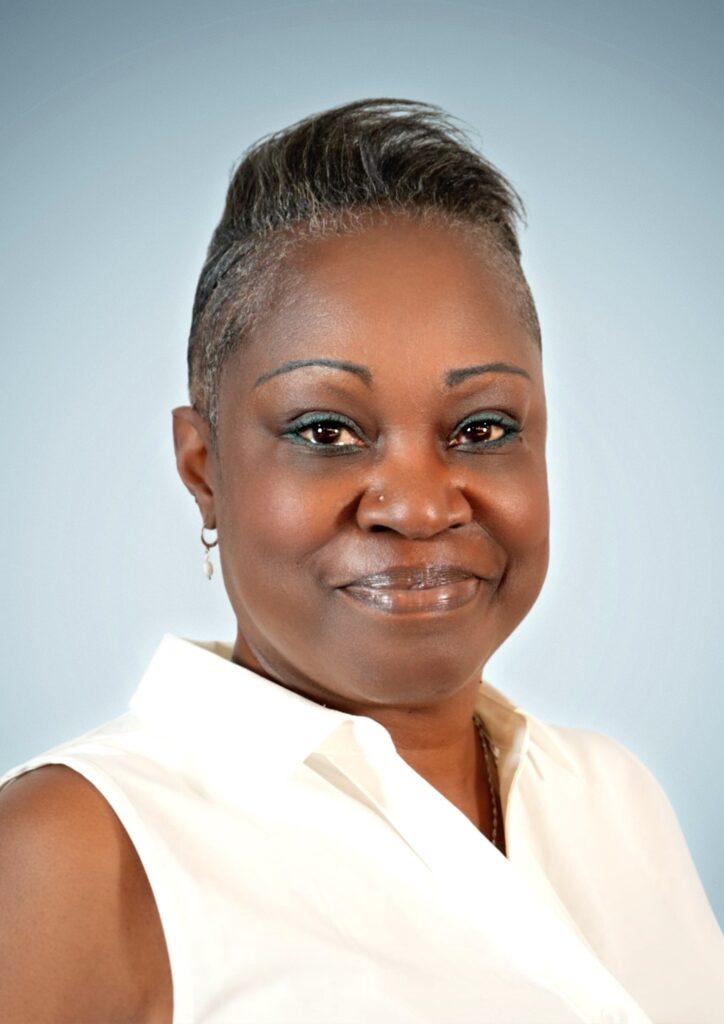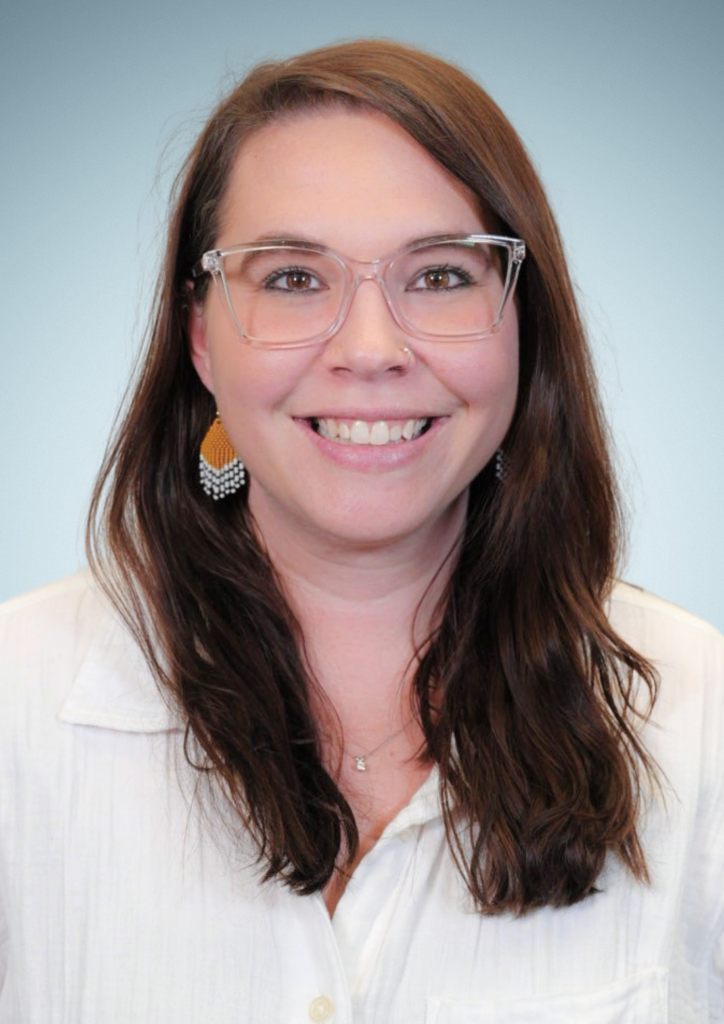End Homelessness Winnipeg has led or participated in a variety of research initiatives that can help us to better understand the experiences, needs and demographic characteristics of those experiencing or at risk of homelessness in Winnipeg.
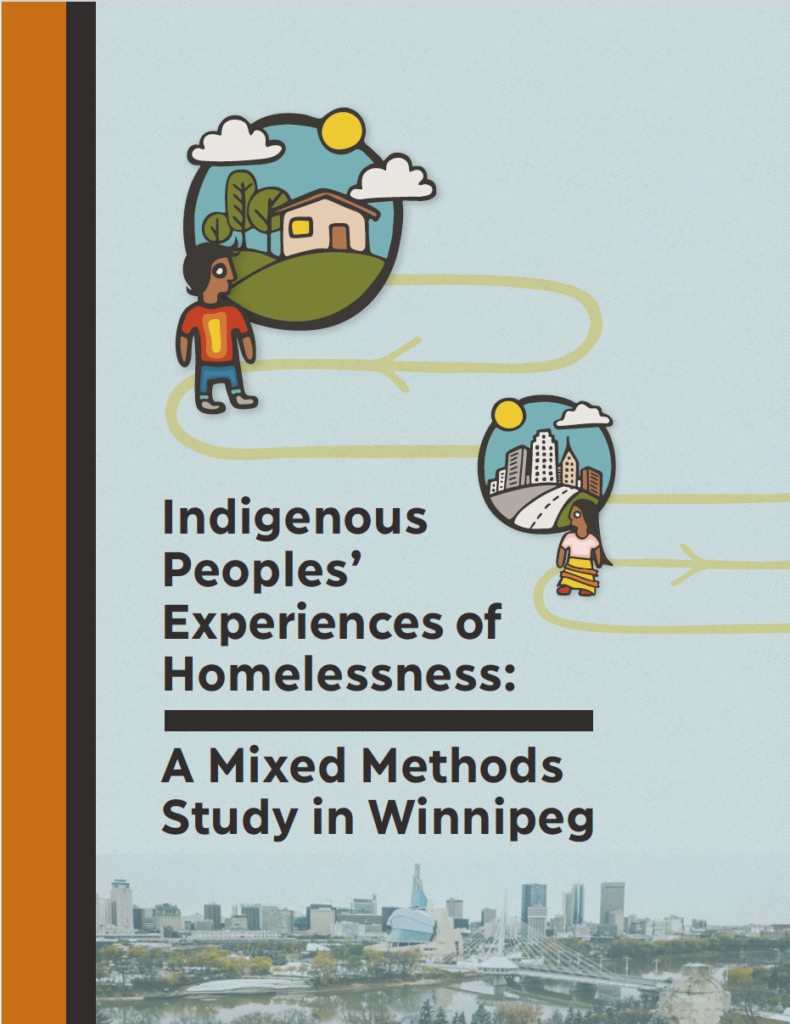
2024 Indigenous Peoples’ Experiences of Homelessness: A Mixed Methods Study in Winnipeg (.pdf)
A comprehensive report by End Homelessness Winnipeg examining the unique experiences of homelessness among Indigenous peoples in Winnipeg. The study highlights key challenges, systemic barriers, and culturally responsive solutions to address Indigenous homelessness.
In January 2025, End Homelessness Winnipeg presented the report’s key findings and recommendations at the First Nations Health and Social Secretariat of Manitoba Conference in Winnipeg. Moving forward, we will actively engage community partners to discuss the report’s insights and collaboratively advance solutions that support Indigenous-led approaches to ending homelessness.
Infographics | Concept Board 1 | Concept Board 2
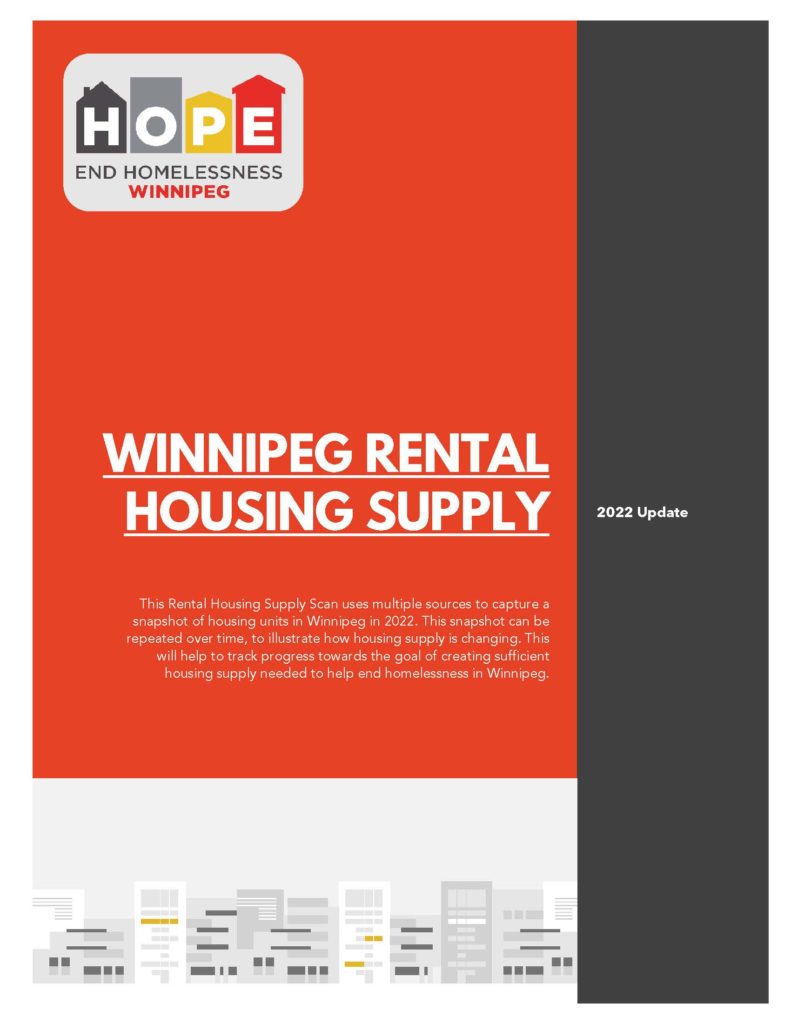
2022 Winnipeg Rental Housing Supply Baseline Scan(.pdf)
A snapshot of rental housing that can be repeated over time, to illustrate how the city’s housing supply is changing
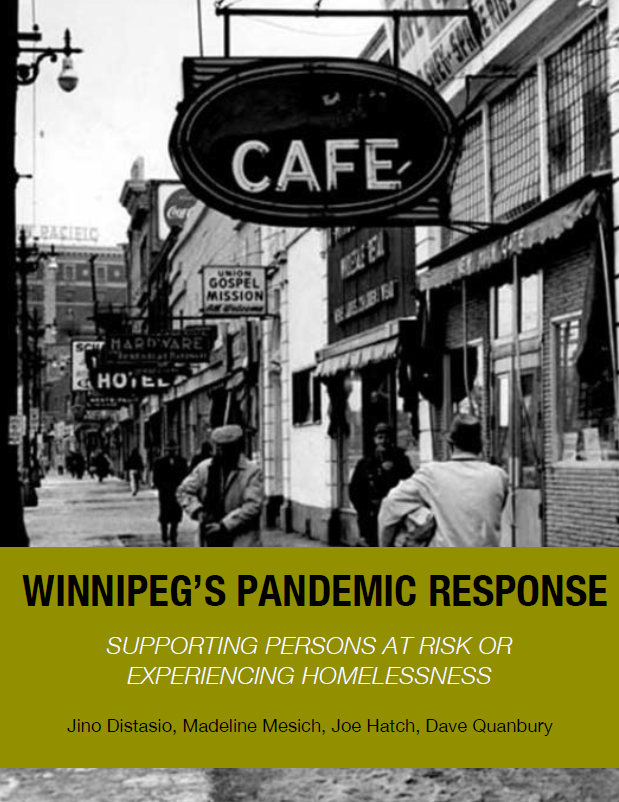
2022 Winnipeg’s Pandemic Response(.pdf)
The objective of this report was to look at the manner in which Winnipeg responded to the needs of persons experiencing homelessness during the pandemic. This was accomplished through interviews and review of materials provided. In the broadest context, the global community was ill prepared to address the enormity of the pandemic and its devastating reach and impact. In many ways the pandemic amplified the deep faults in a very unequal system.

2022 Sharing the Journey of Coordinated Access in Winnipeg (.pdf)
This report provides an overview of Winnipeg’s journey to a coordinated housing and homelessness system.

2021 Interim Street Census Community Report (.pdf)
- Infographic 1 (.png)
- Infographic 2 (.png)
The 2021 Interim Street Census Community Report offers a limited, time-specific glimpse of homelessness in Winnipeg.
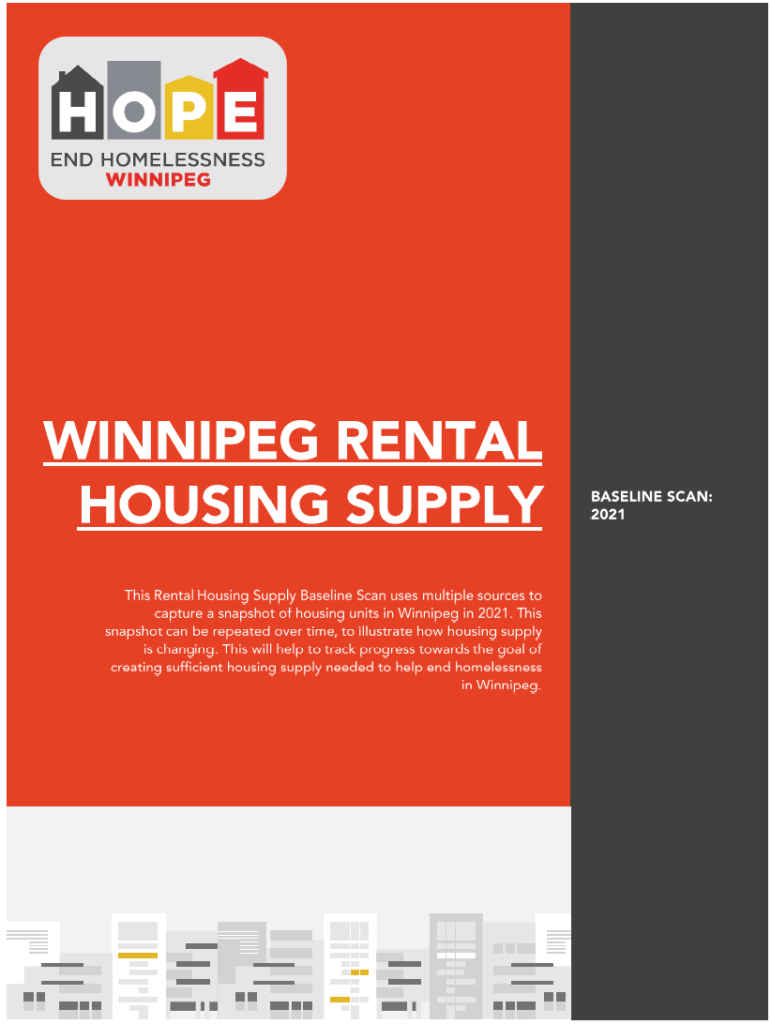
2021 Winnipeg Rental Housing Supply Baseline Scan (.pdf)
A snapshot of rental housing that can be repeated over time, to illustrate how the city’s housing supply is changing.
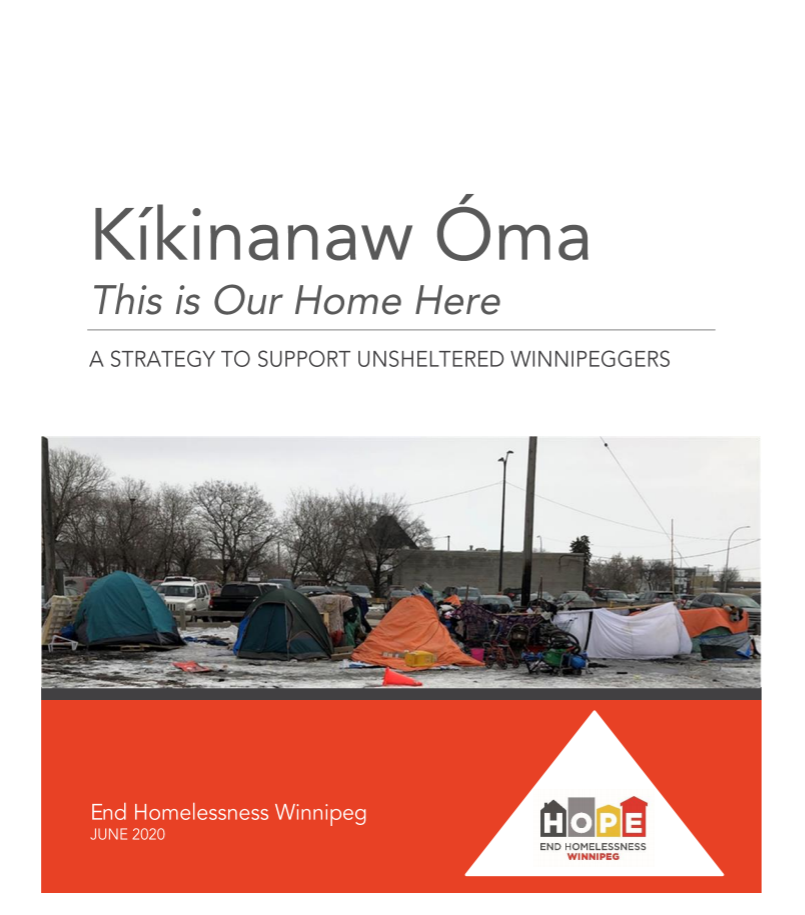
2020 Kíkinanaw Óma – A Strategy to Support Unsheltered Winnipeggers (.pdf)
- 2021 Kíkinanaw Óma Unsheltered Strategy 1-Year Report (.pdf)
- 2021 Guide – What to Do if encountering someone who may be experiencing unsheltered Homelessness (.pdf)
- 2020 Media Toolkit for Reporting on Homelessness (.pdf)
The Strategy offers context on unsheltered homelessness and encampments in Winnipeg, provides an overview of the work of the Kíkinanaw Óma Strategy group, and makes six key recommendations for supporting individuals experiencing unsheltered homelessness or living in encampments.
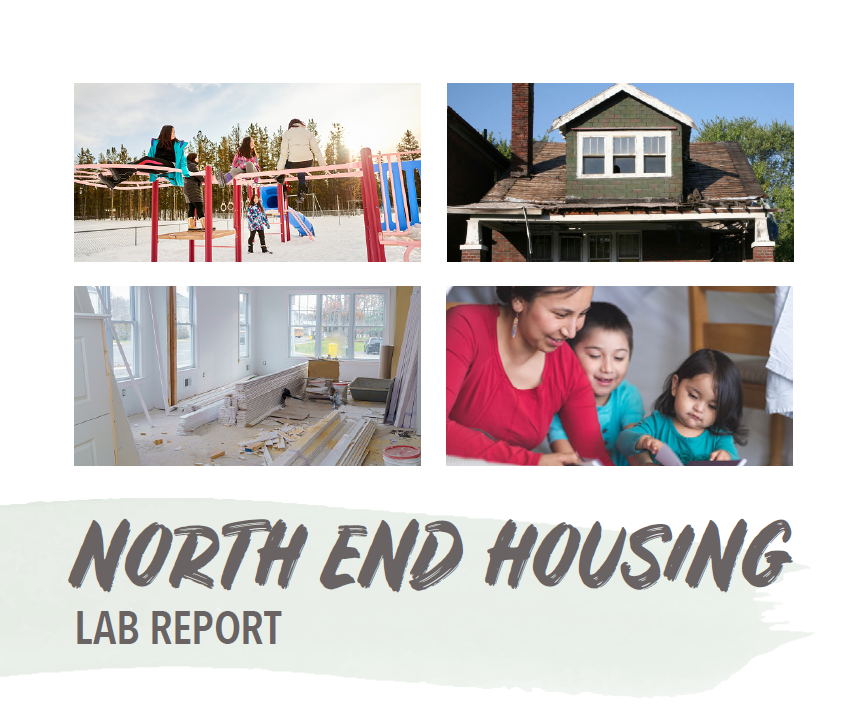
2020 North End Housing Lab Report (.pdf)
Starting in the Spring of 2019, The Winnipeg Boldness Project and End Homelessness Winnipeg facilitated a North End Housing Lab. The result, outlined in the Lab Report, is four key prototypes that form parts of a wholistic approach to housing in Winnipeg’s North End.
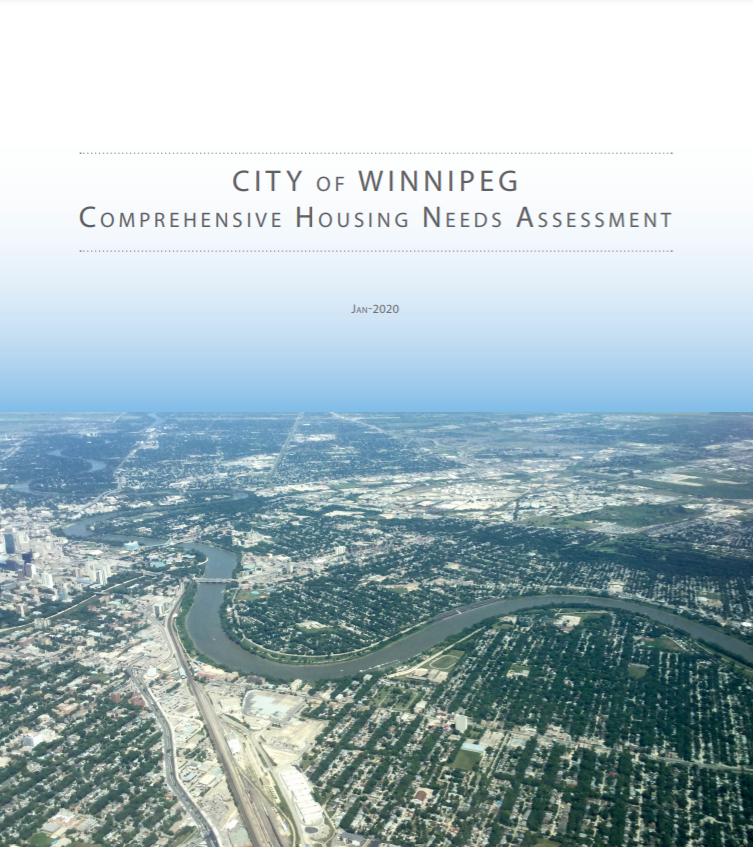
2020 City of Winnipeg Comprehensive Housing Needs Assessment (.pdf)
The primary purpose of this report is to provide a comprehensive assessment of current and future housing needs in the City of Winnipeg.

2019 Connecting the Circle: Gender-Based Strategy to End Homelessness in Winnipeg (.pdf)
Connecting the Circle aims to prevent and end homelessness for diverse women, trans, Two-Spirit, and gender non-conforming people in Winnipeg by closing system gaps that create gendered paths into homelessness and/or barriers to exiting homelessness.
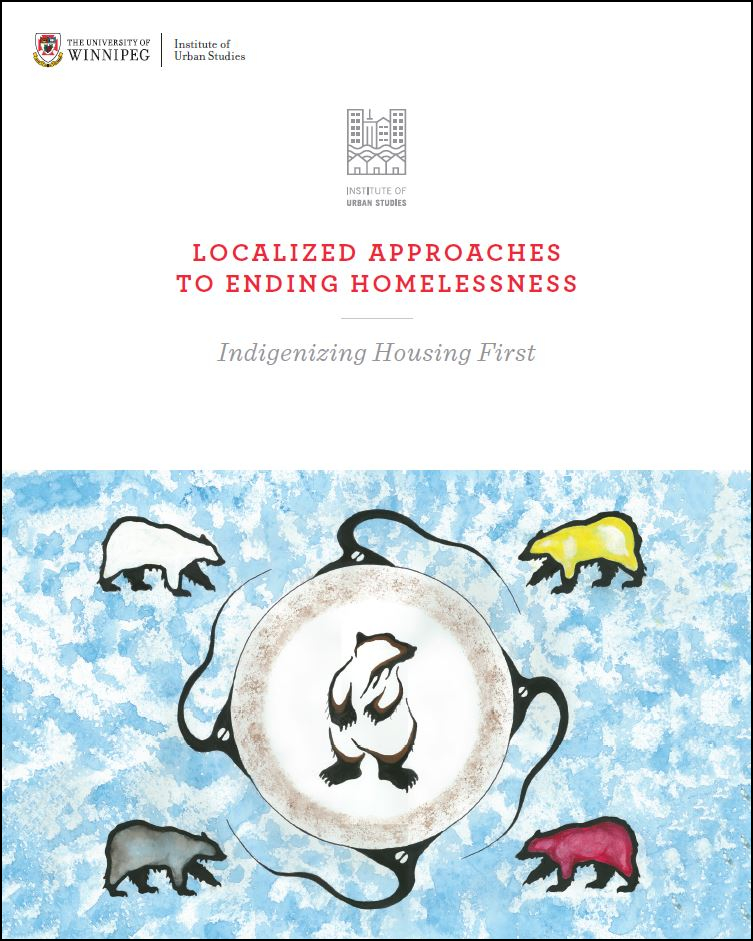
2019 Localized Approaches to Ending Homelessness: Indigenizing Housing First (.pdf)
Based in learnings from Winnipeg’s participation in the At Home/Chez Soi project, this report serves as a general guide for implementing and delivering Housing First, particularly in Indigenous community contexts.
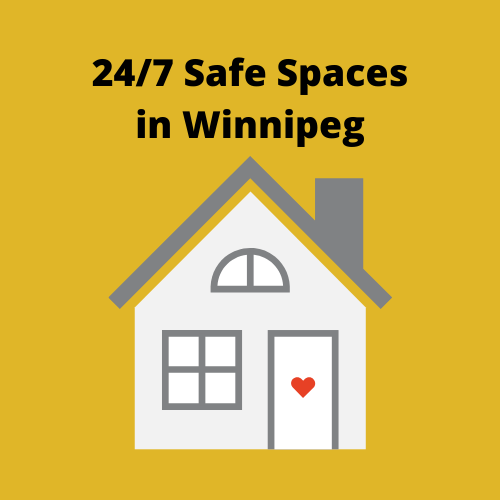
2019 24/7 Safe Spaces in Winnipeg (.pdf)
- Summary of Recommendations (.png)
End Homelessness Winnipeg shared its research and recommendations on 24-7 Safe Spaces with the City of Winnipeg to help inform the development of new municipal grants supporting 24-7 Safe Spaces. This report shares why 24-7 Safe Spaces are needed and what criteria are important to consider in setting up new 24-7 Safe Spaces.
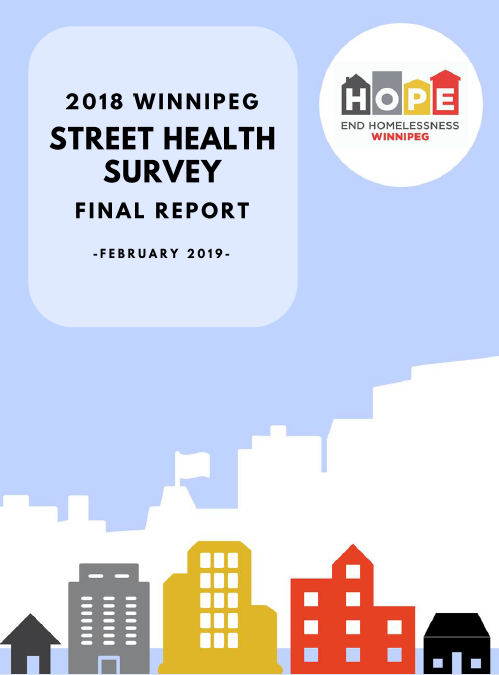
2018 Winnipeg Street Health Survey Final Report (.pdf)
- Fact Sheet #1: Self-Reported Physical Health (.pdf)
- Fact Sheet #2: Self-Reported Mental Health and Substance Use (.pdf)
- Fact Sheet #3: Housing and Homelessness (.pdf)
- Fact Sheet #4: Daily Life (.pdf)
- Sub Report: Gendered Homelessness in Winnipeg (.pdf)
- Infographic 1: Gendered Homelessness in Winnipeg (.png)
- Infographic 2: Gendered Homelessness in Winnipeg (.png)
Between July and October 2018, 406 individuals took part in the 2018 Winnipeg Street Health Survey. The Final Report shares findings on the self-reported health status, housing, and social service needs of individuals experiencing homelessness in Winnipeg.

2018 Winnipeg Street Census Final Report (.pdf)
On the night of April 17-18, 2018, over 300 volunteers and staff of agencies working with people experiencing homelessness interviewed people about where they stayed and heard their stories. This second Winnipeg Street Census gave us our best snapshot yet of the population experiencing homelessness, providing governments, researchers, and agencies critical information on how to better meet their needs.

2018 Housing Models and Development Framework (.pdf)
Through research and consultation, End Homelessness Winnipeg’s Housing Models and Development Working Group identified housing development priorities for 2018-2025.

2018 Keeping Winnipeg Affordable: Exploring the Potential for Inclusionary Housing in a Slow-Growth City (.pdf)
This research informs the potential for Inclusionary Housing measures in Winnipeg. Inclusionary housing is a one tool available to cities seeking to increase affordable housing supply.
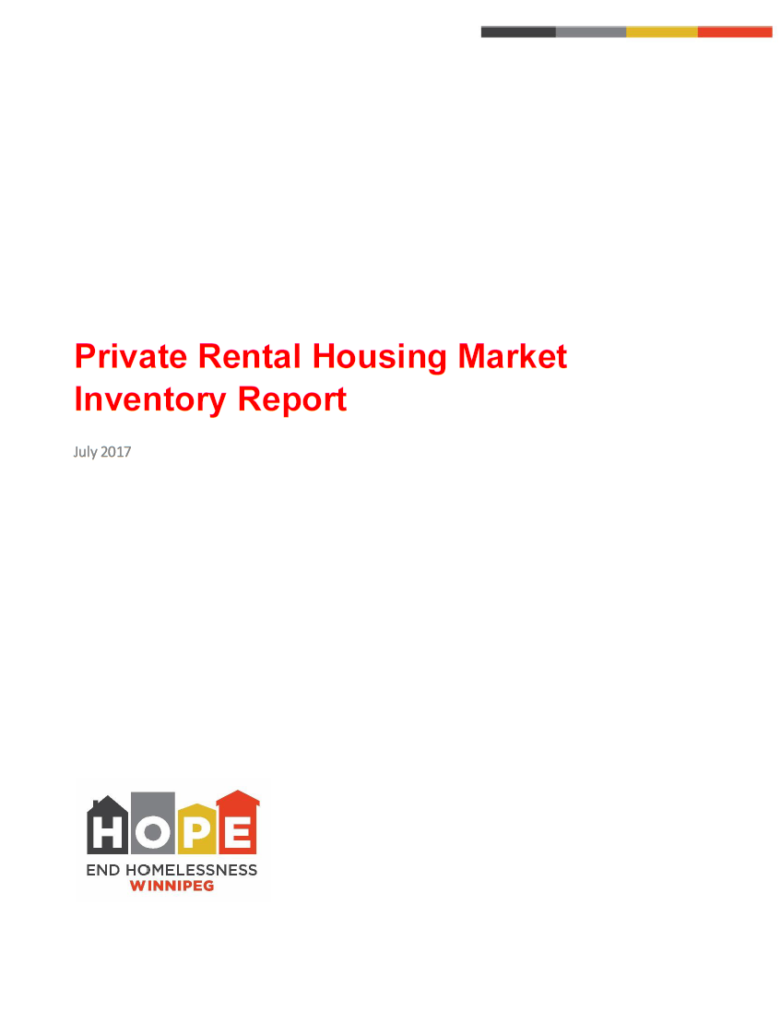
2017 Winnipeg Private Rental Housing Market Inventory Report (.pdf)
This report aims to help understand trends in the private rental market that occurred in from 2006 – 2016 and how these trends may affect those experiencing or at risk of homelessness.
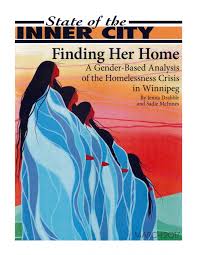
2017 Finding Her Home: A Gender-Based Analysis of the Homelessness Crisis in Winnipeg (.pdf)
This study renews calls to action to deal with the unjust situation of gendered homelessness, so that we may end women’s homelessness in Winnipeg and Manitoba.
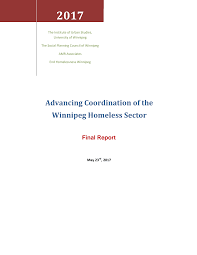
2017 Advancing Coordination of the Winnipeg Homeless Sector (.pdf)
This report was designed to identify service gaps and coordination opportunities that can be utilized by the Community Advisory Board (CAB) and Community Entity (CE) in their roles under the former Homelessness Partnering Strategy, the federal precursor to Reaching Home.
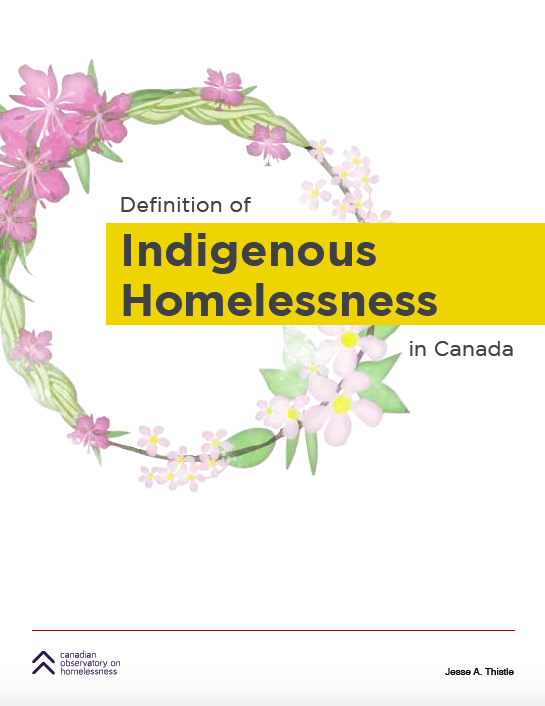
2017 The Definition of Indigenous Homelessness in Canada (.pdf)
Unlike the common colonialist definition of homelessness, Indigenous homelessness is not defined as lacking a structure of habitation; rather, it is more fully described and understood through a composite lens of Indigenous worldviews.

2016 Here and Now: the Winnipeg Plan to End Youth Homelessness (.pdf)
- Youth Engagement Toolkit (.pdf)
Here and Now was developed to guide policy, funding, program development, and collective action priorities, grounded in the principles of reconciliation, towards a city where all youth have a safe place to live and thrive.
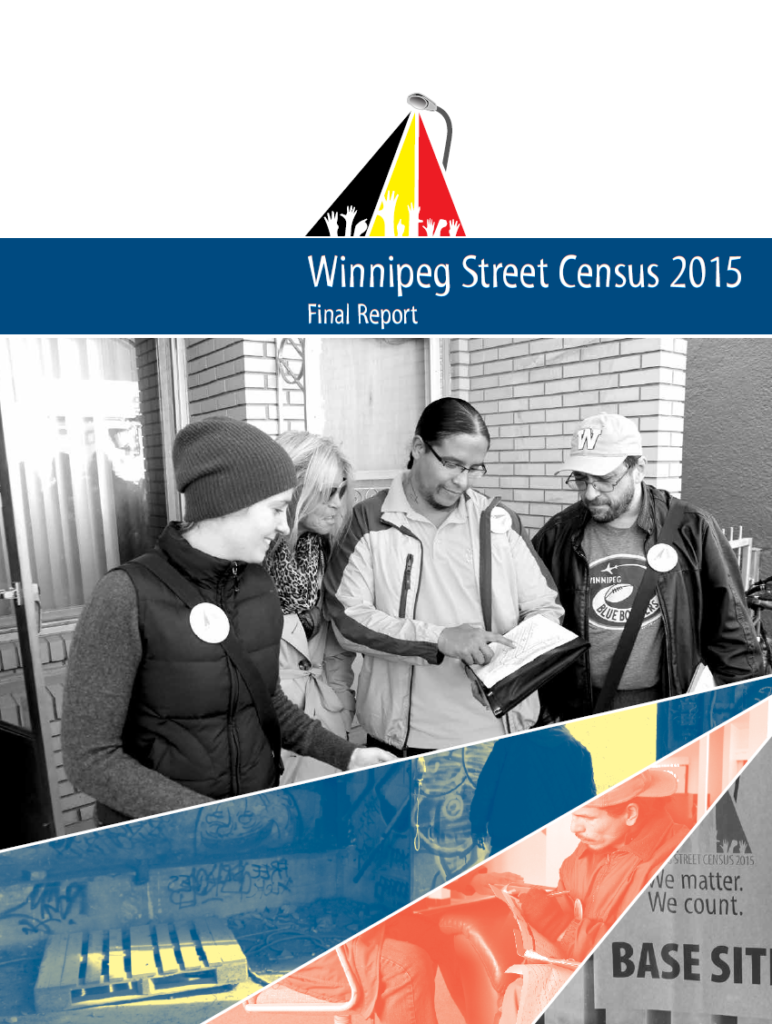
2015 Winnipeg Street Census Final Report (.pdf)
The 2015 Winnipeg Street Census was conducted in Winnipeg on October 25/26th, 2015. Almost 300 volunteers met with a huge variety of people living in emergency shelters, temporarily with friends and relatives, under bridges and at other temporary spaces. The report includes a set of principles for addressing homelessness and recommendations for immediate actions to end it.
